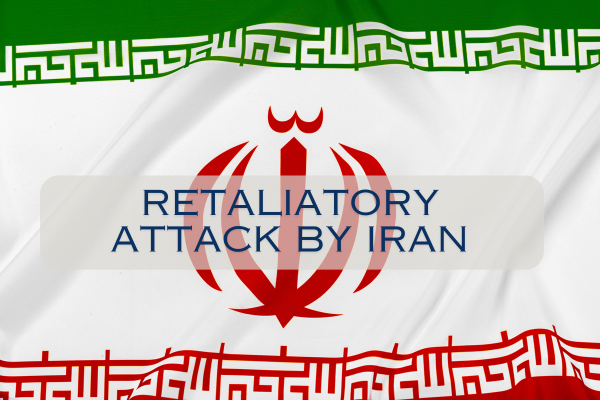What is driving U.S. policy after Iran’s attacks on Israel? After Tehran’s retaliatory attack—the first by the Islamic Republic directly on Israel—the United States appeared ahead of the game in constraining Tel Aviv from igniting a kinetic war. That’s after Israel attacked the consular section of the Iranian embassy in Damascus. That was a piece of real estate that was Iranian sovereign territory under international law. Iran’s retaliatory attack was bound to happen. And the Americans knew it. The game therefore was not to stop the Iranian attack. It was to restrict the damage that it would cause so that Israel was not pushed into an immediate military response. A pre-cooked narrative that the Iranian missiles were ineffective was therefore also necessary to showcase Israel’s robust preparedness. That further undermined Tel Aviv’s need to retaliate.
Incidentally, Iran had declared its intent to “punish” Israel for the assassination of Brig. Gen. Mohammad Reza Zahedi. He was a top Iranian Quds Force Officer killed during the embassy strike on April 1. Zahedi was the highest-level officer to be assassinated after the killing in the drone strike of Qassem Soleimani. Soleimani was the face of the “axis of resistance” comprising Iran, Syria, and the Lebanese Hezbollah. Yemen’s Ansarullah and the Islamic Resistance of Iraq—an organisation that includes Kataib Hezbollah and the Harkat Hezbollah al-Nujaba—have subsequently joined Iran’s trans-national coalition.
The imminence of an Iranian attack drew into the picture, the chief of the Central Intelligence Agency. That’s William Burns, the American firefighter-in-chief. According to a Twitter post by ‘Clash Report’ on April 14, Burns asked Turkish National Intelligence Organization (MIT) chief Ibrahim Kalın to mediate between Iran and Israel.
The posting further added that Iran also informed Türkiye in advance of its planned operation against Israel. “Iran informed us in advance of what would happen. The U.S. conveyed to Iran through us that this reaction must be within certain limits,” the Turkish source said. “In response, Iran said the reaction would be a response to Israel’s attack on its embassy in Damascus and that it would not go beyond this.”
Following the Iranian counterstrike, the Americans took a stunning step. U.S. President Joe Biden told Israeli Prime Minister Benjamin Netanyahu during a call that Washington will not support any Israeli counterattack against Iran. That is according to Axios quoting a senior White House official. Israel was on its own in case it escalated, was the supposed message.
Key US allies—Britain and France dutifully broadcasted Washington’s line.
Incidentally, this is not the first instance when the Americans have rapped the Israelis on the knuckles. Most dramatically, it happened during the famous Suez crisis of 1956. Former Egyptian President Gamal Abdel Nasser triggered that pivotal event by nationalizing the Suez Canal. Israel backed by Britain and France had to backtrack from plans to depose Nasser and reopen the canal. The trio, including Israel, withdrew following pressure from the United States and the Soviet Union. Those two were at that point of time freshly minted superpowers who then announced the marginalization of the former colonial powers in the global pecking order.
So why are the Americans, who have no love lost for the Iranians, now pushing the Israelis to stop further escalation? Three factors stand out.
First, is obviously oil. Prior to their counterattack, the Iranians seized an Israeli-owned ship in the Strait of Hormuz. The messaging here was important. By taking over the commercial ship, the Iranians were signalling that they rule the Strait of Hormuz. The subtext was obvious—that the Iranians have the will and capacity to impede global energy flows of oil as the Strait of Hormuz, which is one the primary channels for hydrocarbon exports. An Iranian blockade would immediately alarm the US and its Gulf allies. The region channels nearly 88 per cent of its oil exports through Hormuz. A sustained period of stratospheric oil prices would likely follow, severely undermining the global economy which is still struggling to recover from Covid.
Second, there are compelling geopolitical factors that the Americans can ignore at their own peril. In case energy supplies from the Gulf are restricted, Russia, Washington’s arch foe is certain to benefit. Fuel guzzling rising economies such as China and India are likely to further expand energy imports from Russia. That would make a mockery of US-led sanctions against Moscow in the aftermath of the Ukraine war. Armed with a war-chest of petro-Roubles, the Russian war machine would be in an even better position to win the war of attrition against Ukraine. That would completely change the global and European balance of power in Moscow’s favour.
Third, with domestic pressures rising, it is only a matter of time when the Americans would have to divert their war material from Ukraine to Israel. Supporting a two-front war, with China sniping at Washington’s heels in the Indo-Pacific, may become unstainable. A diversion of resources to West Asia, would open the prospects of a big strategic triumph for Putin’s Russia. And have a fallout of undermining the integrity of the US-led Atlantic alliance, and opening the door for a robust multipolar world.
Already the Ukrainians are crying foul in anticipation of diversion of war material to the Middle East. Ukrainian President Vladimir Zelensky called it a “shame …and pure politics.” He’s referring to the decision by the Speaker of US House of Congress to divide American aid between Israel and Ukraine.
One final thought—what if Netanyahu defies the US? What if he still goes ahead, and drags the Americans in to a hot-war? It is hard to predict if a resulting regional war would mutate into a global one. But, the Israeli Prime Minister would nevertheless have deflated U.S. prestige on the global stage with his defiance, generating a power vacuum that rising powers could well be positioning themselves to fill.
(Atul Aneja is a Senior Fellow at USANAS foundation. He is the former editor of India Narrative and Strategic Affairs Editor of The Hindu)
















